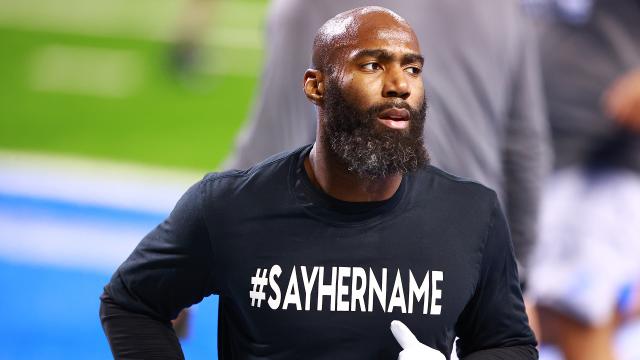The Rush: Saints’ Malcolm Jenkins on policing in America, the fight against social injustice
Two-time Super Bowl champion Malcolm Jenkins joins The Rush to talk about recent social justice issues in America, the significance of the MLB’s decision to move the All-Star game out of Georgia and what NFL owners, fans can do to help create change.
Video Transcript
MALCOLM JENKINS: I would love to see the NBA and specifically the NFL do more when it comes to its owners being active in this fight as well.
LIZ LOZA: What's up? I'm here with New Orleans Saints safety Malcolm Jenkins. Hello, Malcolm. How are you? Thanks for rushing with me today.
MALCOLM JENKINS: I'm doing well. How are you?
LIZ LOZA: So you have been fantastically, publicly passionate about social justice issues. On Sunday, another unarmed Black man was killed by police. Are there any thoughts you'd like to share on the current issue?
MALCOLM JENKINS: Yeah. Daunte Wright lost his life at the hands of police. And I think we can continue to argue about who's at fault and look at these individual officers but until we really look at what we're doing-- these are just symptoms, right? We got to look at the bigger issue and that's how we police in this country and how we've always policed, until we can imagine a day where we only have firearms in the hands of highly trained, highly accountable people. We'll continue to see this violence. We don't need officers with guns to make traffic stops or to write tickets. We need trained people who know how to deal with domestic disputes to deal with those. People who are trained to deal with mental issues to deal with those. People who are trying to deal with drug addiction and drug problems to deal with that. We ask our police to do way too much, and they are not trained or qualified to even execute those things. So we have to really start to look at ourselves as the problem. And why do we continue to try to do policing the same way, when it's only given us the same results over and over again, and it's not making us safer?
LIZ LOZA: And so education, it sounds like from your perspective, might be at least a starting point in preventing this from consistently happening.
MALCOLM JENKINS: Yeah I think education on many fronts. But I think when you talk about improving the lives of people of color in this country, minorities, it has to be done in an economic way, and it has to be an opportunity for people to grow wealth and do right for themselves. And I think right now you see the majority of the violence is not by happenstance that it's in the poorest communities in our country. In places that we don't invest in, the people that we don't invest in, the people that we don't give opportunities to, oftentimes leads to crime and desperation. And that's where we start to look at opportunities. So how do we create avenues for people who look like me to be in executive positions, to be enabled to invest and grow their money so that they can have a larger impact? But how do we also knock down some of the hurdles when it comes to policy and legislation that run and govern our way of life? How do we knock down some of those hurdles and get involved on a policy level and more to politics?
LIZ LOZA: The MLB moved the All-Star game out of Georgia due to the recent overhaul of the state's election laws, which is if we're being honest, a blatant attempt at voter suppression. When baseball, one of the major sporting leagues in our country, doesn't just stick to sports, do you feel that that changes the public's perception of social justice issues?
MALCOLM JENKINS: Well, I hope so. And what's unique and what we have to appreciate about what MLB did, is that it wasn't just about the pageantry, and the branding, and the hashtags, and t-shirts, and on field or on court things, it was a real action that affects dollars. That makes people move, right? And that's how I would love to see the NBA and specifically the NFL do more when it comes to the owners being active in this fight as well. We've seen players on the mic. We've seen the branding and the commitment that they've made to some of the messaging. But we have some very, very powerful men that own these teams that can also have that same effect in their markets, in their city and state, to really make the changes that their players and the communities are so desperately crying out for.
LIZ LOZA: And that was actually my next question to you. Because as you mentioned, we've seen the NFL do almost a complete 180 on its messaging, but this is the most powerful sporting league in America. What else can they do to help create change? Can you talk more about maybe the owners POV?
MALCOLM JENKINS: Well, I think the owners, they've been able to hide behind Roger Goodell in the shield, right? In the name of the NFL but that's just a company name. The real movers and decision makers of this company are these team owners. And the best part about that is a lot of these issues, we talk about them in a national manner, international forum, but the majority of them are state and local level. So the amount of impact that a team owner can have in his city alone is far greater than what any of his players can do. And so when you start to see examples like what MLB did and how they moved a game from that city-- we've seen sports do that around other things before. And if we see them when they want to move, they can do it. It's just a matter of their appetite. Noe, they have to decide which side of this movement are we on? Are we getting behind our players, or are we just allowing our players to speak their minds? I think that's where we've seen the background and the makeup or the lack of diversity in NFL ownership shows up in that space. Who are the owners? There are a few who have definitely helped, but in large, it's been the counternarrative as opposed to the sport.
LIZ LOZA: How can fans help push owners into a new level of accountability, then?
MALCOLM JENKINS: Well, I think it starts with even as a fan having the accountability to yourself. Are you involved in what's happening in your community? Do you know what's happening? But the NFL-- I don't know if anybody's noticed, but they move based off of public perception. They care very much about how their brand and shield is viewed by its patrons. And so if the fans speak up, as you want to see teams get involved in these things, you want to see that, things move. What we saw pretty much from 16 to 19 where players had to fight tooth and nail to get the NFL to support some of these causes, all of a sudden, the narrative of our nation changed, the people spoke up and within that fast you have the NFL change its entire branding to be in line with what society wants.
So in this matter, the fans have probably more influence over the league than we do as players. And we're speaking the same language. When it's not about isolating people or dividing us but about figuring out ways to eradicate some of the systems that we see plaguing these communities, knowing that that's not going to be an easy thing but we are moving toward the same goal. When that's the narrative, and not about a flag, or somebody's patriotism, or individualism, but more of a collective, hopefully, the NFL and its owners will get involved in a major way.
LIZ LOZA: And there should be a push to build equity and invest in Black and Brown communities something that you have absolutely done with the creation of Malcolm Inc. In fact, you're here on behalf of Disrupt Foods, which is a Black owned business. Can you please tell us more about it?
MALCOLM JENKINS: Yeah, so this week, we're announcing our launched Malcolm Ate, which is a parent company to a lot of the other work that I do. Disrupt Foods is my franchise, and we've got about 12 quick service restaurants under our portfolio. And what we're trying to do or what we're recognizing is that when you look at franchising alone and the racial makeup of who the franchisees are, there's about 15% of people of color that our franchisees, and it's even less than that when you talk about the top brands in the quick service restaurant industry.
And so what we want to be able to do is take my peers, athletes, and entertainers that we know and give them opportunities to get into some of these franchising brands but doing that knowing that it's an operations game. So we know that operations when it comes to the food industry is everything. And we figured out how to be successful in that space, and so we want to give opportunity for players to be able to put their money and diversify some of their portfolios with some franchising without having to do the back end on the operating.
We took the same approach last year when we started Broad St. Ventures, which is a venture capital fund. The same thing-- completely funded by Black athletes and entertainers and completely managed by African-Americans as well, which means that's one of the only or one of the only few to have that kind of makeup, that's completely funded by athletes and completely run by African-Americans and with the idea that guys can get into better deals when we do it together.
LIZ LOZA: Well, Malcolm, where we going to see you on "Shark Tank."
MALCOLM JENKINS: I'm trying to deal with off camera before I get on here, but I'm definitely open to something like that. Sure.
LIZ LOZA: Malcolm, it has been a pleasure chatting with you today. Thank you so much for rushing with us.
MALCOLM JENKINS: Thank you.
[MUSIC PLAYING]








